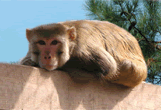 |
||||
| Faculty Publications Faculty Presentations Guest Speakers Recent Research |
|
Tulane converts an animal lover with its Primate Research Center I JUST knew I was going to cry. I didn’t know what to expect when I visited the Tulane National Primate Research Center. I feared the worst. I am what anyone would call a huge animal lover. At any given time, you can find me either fostering or transporting unwanted, neglected or abused dogs for the breed rescue I’m in or volunteering for various fund-raisers for animal shelters. The people in Honduras I came to know over the last two summers even gave me a nickname to sum up my love for animals – “Santa de Perros,” or “the saint of dogs” because I always carry dog food and biscuits around to feed hungry-looking animals. So I just knew writing the story you see on page one this month was going to upset me. In fact, I stayed awake most of the night before my visit, with my stomach tied in knots. As I rode with Fran Simon, public relations director for the Tulane School of Public Health, I took a deep breath and asked, “Am I going to see things that will make me cry?” Fran, an animal person, too, assured me that I would be fine. And I was. The people I met at the Primate Center seem to really care about the animals there. Over and over they assured me that they wouldn’t be doing animal testing if it wasn’t an imperative step in finding cures for disease. Then, I saw the monkeys – running around in quarter-acre areas, playing like children with balls and toys and wresting each other. Some of the monkeys, I was told, are as old as 30 years. Most of the primates at the facility are used for breeding and never tested. Those selected for tests, I was assured, are treated as humanely as possibly by a staff of veterinarians and other caregivers. The primate center made me smile, believe it or not. I did tear up though, when I looked up Krabbé disease, Globoid-Cell Leukodystrophy, on the Internet. There are a myriad of web sites dedicated to children who are fighting – or who have lost the fight – to the disease. How sad to see pictures of babies or young children with birth and death dates listed beneath. Reading about the battles these children and their families face as they spend their youth in and out of hospitals – usually never making it to kindergarten – really touched me. According to the National Institute of Neurological Disorders and Stroke web site, the disorder is generally fatal before a child reaches a second birthday. Symptoms vary and included loss of previously attained developmental skills, unexplained fevers, irritability, myoclonic seizures (sudden, shock-like contractions of the limbs), blindness, spasticity (stiffness of the limbs), weight-loss and paralysis. What an absolutely awful thing for a baby – and its family – to have to go through. And if the primate center research can lead to treatments and a cure for this disease, then the research is absolutely necessary. I imagine I could have found lots of other stories had I gone on to look for people battling AIDS or malaria or any of the other disorders they’re researching at the center as well, but I didn’t have to go that far. Seeing one web site with multiple pages of baby pictures, and little angels flying over the ones who have passed away, was all the convincing I needed. I’m still opposed to animal cosmetic testing or hurting animals in any other way. But I can honestly say I’m glad the Tulane National Primate Research Center is doing the work it’s doing. As a reporter, you always hope that your stories reach out to people, inform and open minds. It’s really something when writing a story changes your OWN mind, which is something you never really set out to do. |
 Robin Rodriguez |
|
|
|
©2013 Tulane University |